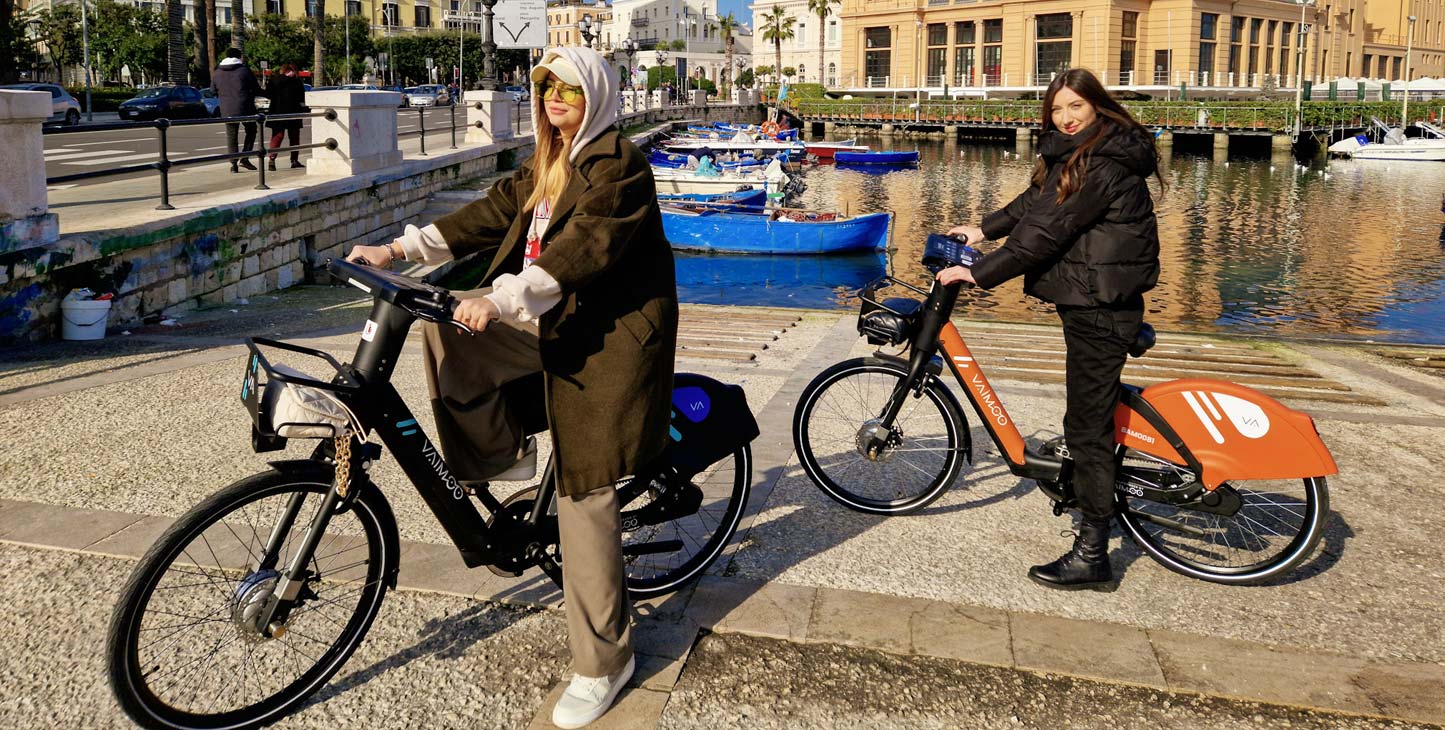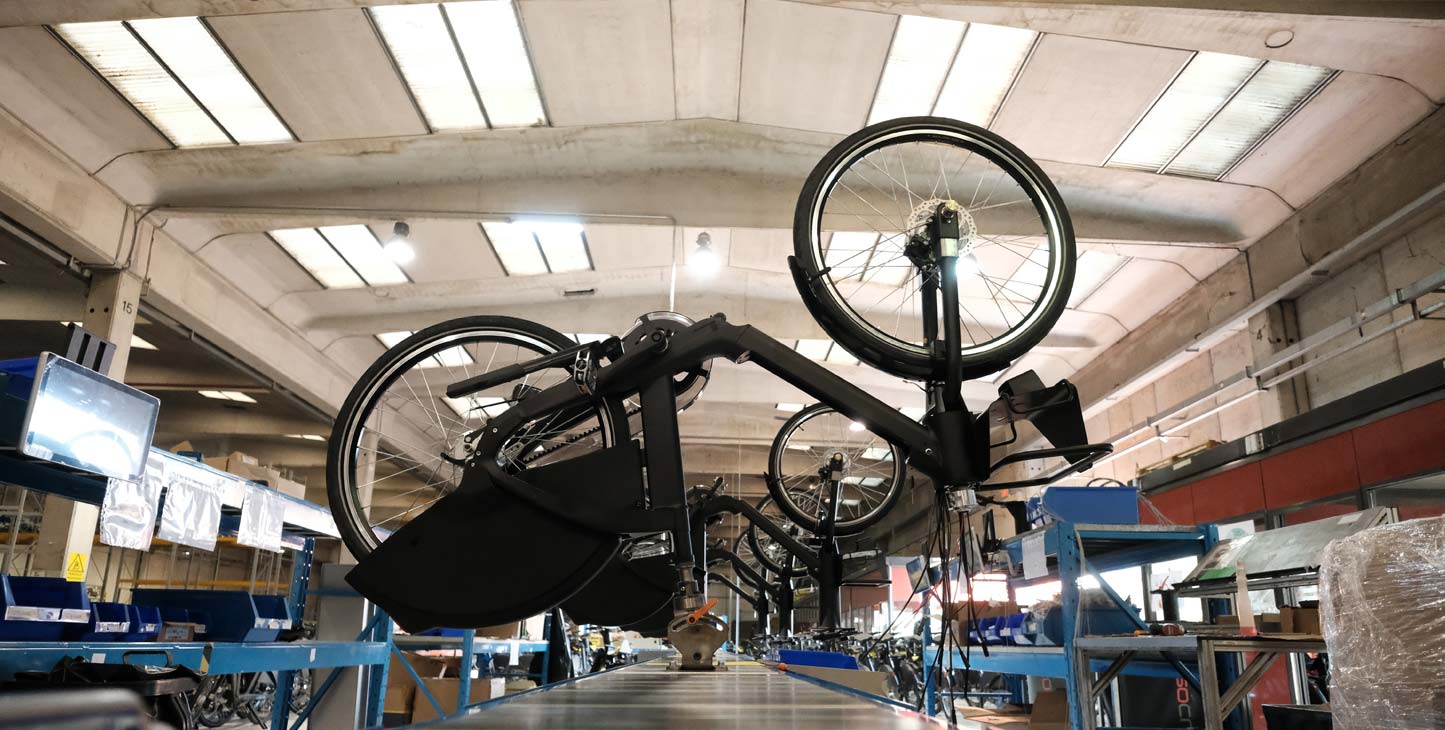VAIMOO: A green and accessible bike sharing solution made in Italy

Bike sharing is a game changer for cities. We talked to Matteo Pertosa, CEO and founder of VAIMOO about integrating bike sharing into the transport ecosystem of a city and making it an inclusive and comfortable option for citizens.
Can you tell us a bit about VAIMOO and what makes it a unique bike sharing solution?
VAIMOO is the connected Made in Italy bikesharing solution currently adopted in the major European cities and green-mobility capitals like Stockholm, Liverpool, Düsseldorf, Berlin, Gdansk, Cambridge and, recently, Bari. Part of Angel Holding, the Italian industrial group focusing on designing and developing technologies for various industries: railway, digital mechatronics and aerospace and aviation. VAIMOO was born with the idea to offer a turn-key bike and e-bike sharing solution entirely designed, developed, and manufactured in-house in Italy ready to be integrated with existent transport networks helping the ecosystem to enhance the way to move for a more sustainable world.
Under the theme Leading the Transition, Velo-city will put the spotlight on topics such as equitable redistribution of public space, building resilient transport systems and creating climate neutral economies. How is VAIMOO leading the transition towards a greener future?
Bikes, unlike other micromobility vehicles, are an inclusive alternative since they are already known in most people’s culture. A practical example of inclusivity? I always refer to my dad: due to his age, he’s most likely to rent a bike rather than an e-scooter. Bikes are something we all know and that most of us use since childhood. Coming to the point of leading the transition: adopting shared-micromobility systems help reduce the space needed to park private cars, resulting in increased availability of urban spaces for citizens who can rediscover their cities at the right speed. In fact, it is proven that bikesharing systems – and micromobility in general – have a traffic calming effect: they positively impact traffic and air pollution, contributing to fighting the use of private cars for daily urban commuting and making cities more liveable while, at the same time, encouraging local services. In order to achieve this, the key inspirations are flexibility, accessibility, and efficiency.

How do you make sure that VAIMOO bikes are accessible to all?
VAIMOO designs – along with the partners involved – a bike sharing system based on the current citizens’ needs. In fact, a sharing system is successful when it facilitates modal shifting and this is achievable when users are at the core of integrated-mobility strategies. For a citizen, a micromobility choice should offer sustainability, comfort, safety, speed and budget. These variables can be improved working on technologies, policies and infrastructures.
Above all, a sharing service should help solving citizens’ problems filling the gap between First and Last Mile typical of public transports: to achieve this, an integrated and multimodal project should guarantee a complete and smooth mobility experience that considers different forms of integration (commercial, physical, and technological) facilitating transport authorities, municipalities, and final users. Moreover, thanks to public funds, the fares of bikesharing services can be kept low and affordable to a wider user base.
What makes VAIMOO a success in cities with a cycling infrastructure still growing, such as Bari?
Characterized by low fares – 24,5€/year subscription – and with an initial fleet of 200 bikes out of 730, Bari registered more than 60.000 km ridden in less than 3 months in winter, saving more than 9 tons of CO2. These are encouraging data, considering the population of 330.000 inhabitants and cycling infrastructures still growing. The stakeholders involved collaborated side by side with VAIMOO to design a Bike Sharing System to support the local Public Transport Network with a sustainable and flexible alternative against the usage of private cars.
This Bike Sharing formula is similar to the ones adopted in other European cities where we are present and which are giving some interesting results, and is a mixture of:
- Public funds which help to improve the recognition of Micro Mobility as the “fourth leg” of public transport, thus worth specific public fundings
- Extremely affordable fares for citizens in terms of subscriptions and ride costs
- Close collaboration between the operator, the provider of the service and the Municipality
- Capillarity of the service – both in the suburbs and the city centre, covering the First and Last Mile gap of Public Transport
- The flexible choice of a hybrid Bike Sharing scheme with virtual stations easy and fast to deploy and relocate, while limiting city clutter
- A connected bike sharing system, which adopts the latest GPS and IoT technologies to avoid vandalism and theft and to be easily integrable with existent transport networks, is thus able to guarantee a better and integrated experience for users.
How are the VAIMOO bike sharing stations integrated into the city’s wider mobility system?
As previously mentioned, the choice of a hybrid bikesharing scheme with virtual stations and physical signs, guarantees flexibility being easy to deploy and relocate in order to follow the constantly changing mobility needs of our cities. Moreover, hybrid schemes help in defining the major intermodal shifting areas, so consequently enabling the conversion into physical docking stations that help reducing maintenance costs such as automatic battery recharge.
What are the next steps for VAIMOO?
VAIMOO is constantly working on improving its solutions by collaborating with the stakeholders involved (operators, municipalities) and also counting on a team of experts that follows the design, development, and manufacturing of the solutions from hardware to software. For instance, in Bari the system deployment is going to be completed progressively in the next years. Currently, Bari has a fleet of 200 bikes/730 over an initial activation of 52 virtual stations out of 120. The road is still long and tough, but we are already counting on positive feedbacks from the citizens, whose instances are collected and analysed to design a better green mobility experience together.
What are you most looking forward to at Velo-city 2023?
Our aim is to underline the success of bikesharing as support for Public Transports, as already mentioned. We are looking forward to discuss and share knowledge with other stakeholders of the mobility industry, because only by working together and defining common objectives a real and effective sustainable changes are possible (environmental, social and economical).




